No escape
For civilians trapped in eastern DR Congo’s cycle of violenceStory and photos by Hélène Caux
Bunia and Plaine Savo, DR Congo
17 January 2023
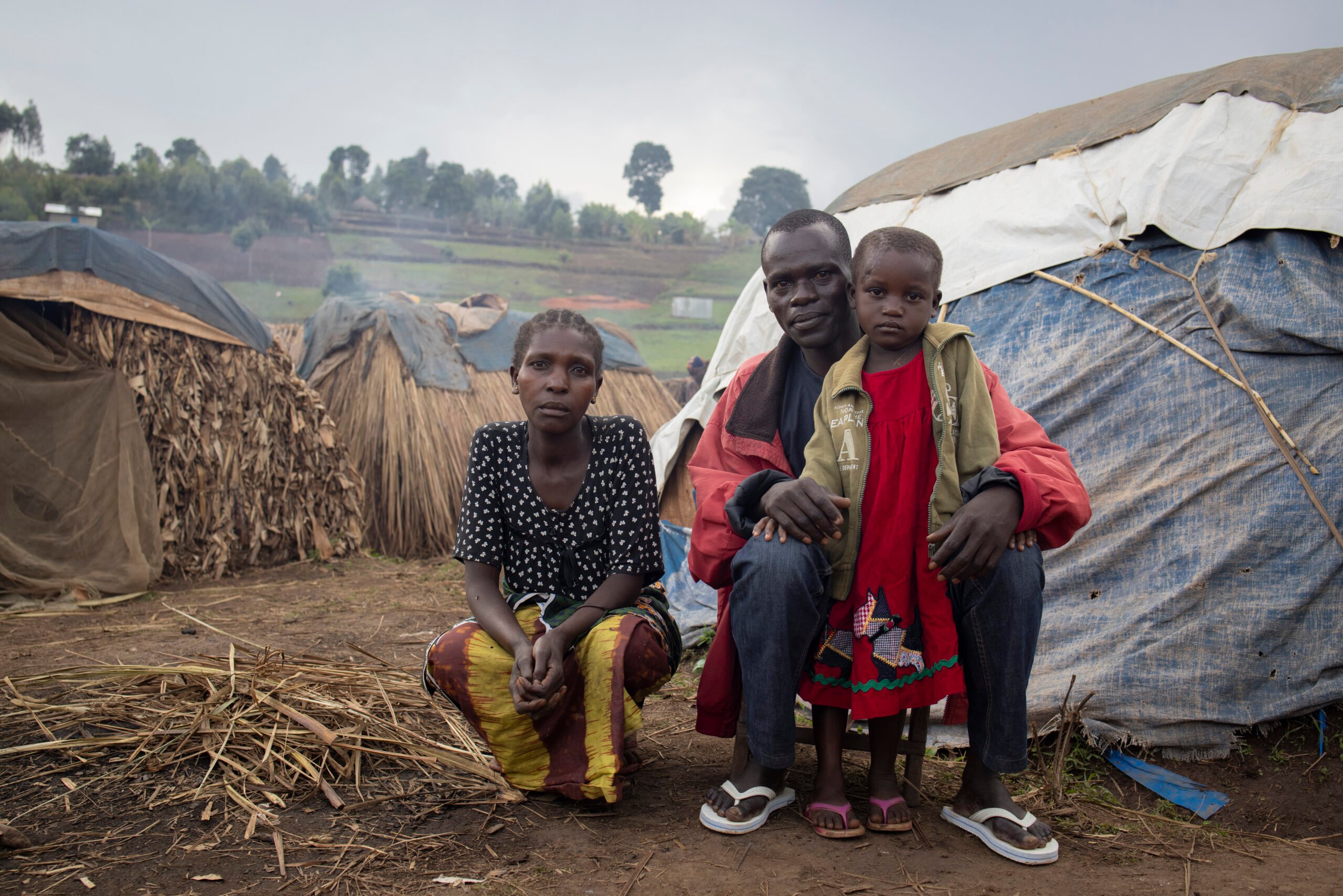
Four-year-old Odette with her parents in Plain Savo site for displaced people. She received machete blows to her head when the site was attacked by armed men on 1 February 2022.
No escape
For civilians trapped in eastern DR Congo’s cycle of violenceA hidden crisis is enveloping DR Congo’s Ituri Province, where civilians face extreme daily violence that has forced 1.8 million to flee their homes.
By Hélène Caux
Bunia and Plaine Savo, DR Congo
17 January 2023
Four-year-old Odette with her parents in Plain Savo site for displaced people. She received machete blows to her head when the site was attacked by armed men on 1 February 2022.
While an upsurge of violence in North Kivu has recently made headlines, a hidden crisis is enveloping neighbouring Ituri Province, where civilians face extreme daily violence that has forced 1.5 million to flee their homes.
Bunia and Plaine Savo, Ituri, DRC – The night her life changed forever, Madeleine*, 30, had prepared a simple dinner of casava for her four children, including two-year-old Emmanuelle who she carried everywhere strapped to her back. After a hard day of work on the family’s small farm, they went to bed exhausted, as silence fell on the village.
At 4 a.m., Madeleine was jolted awake. “The attackers appeared suddenly, they came to our village by foot, brandishing machetes and guns,” she says. “They raided the whole village, going to one house after another.” Forcing their way into Madeleine’s home, the attackers fell upon her children with machetes. In a matter of minutes, all were dead. Turning their merciless attention to Madeleine, they hacked at her right arm, her left hand, and her head. “As they were hitting me, I fell to the floor, too exhausted to fight them off. I did not have the strength anymore, nor the will to live after they massacred my children.”
“I did not have the strength anymore, nor the will to live after they massacred my children.”
Madeleine was nine months pregnant at the time and, when medical staff arrived after dawn, they found her clinging to life. Doctors performed an emergency caesarian section to deliver the baby and tended to Madeleine’s bleeding wounds. “I don’t know how I survived,” she says.
Many villages in Ituri are now abandoned after being attacked by armed groups. Over 1.5 million people in the province have fled their homes over the last five years.
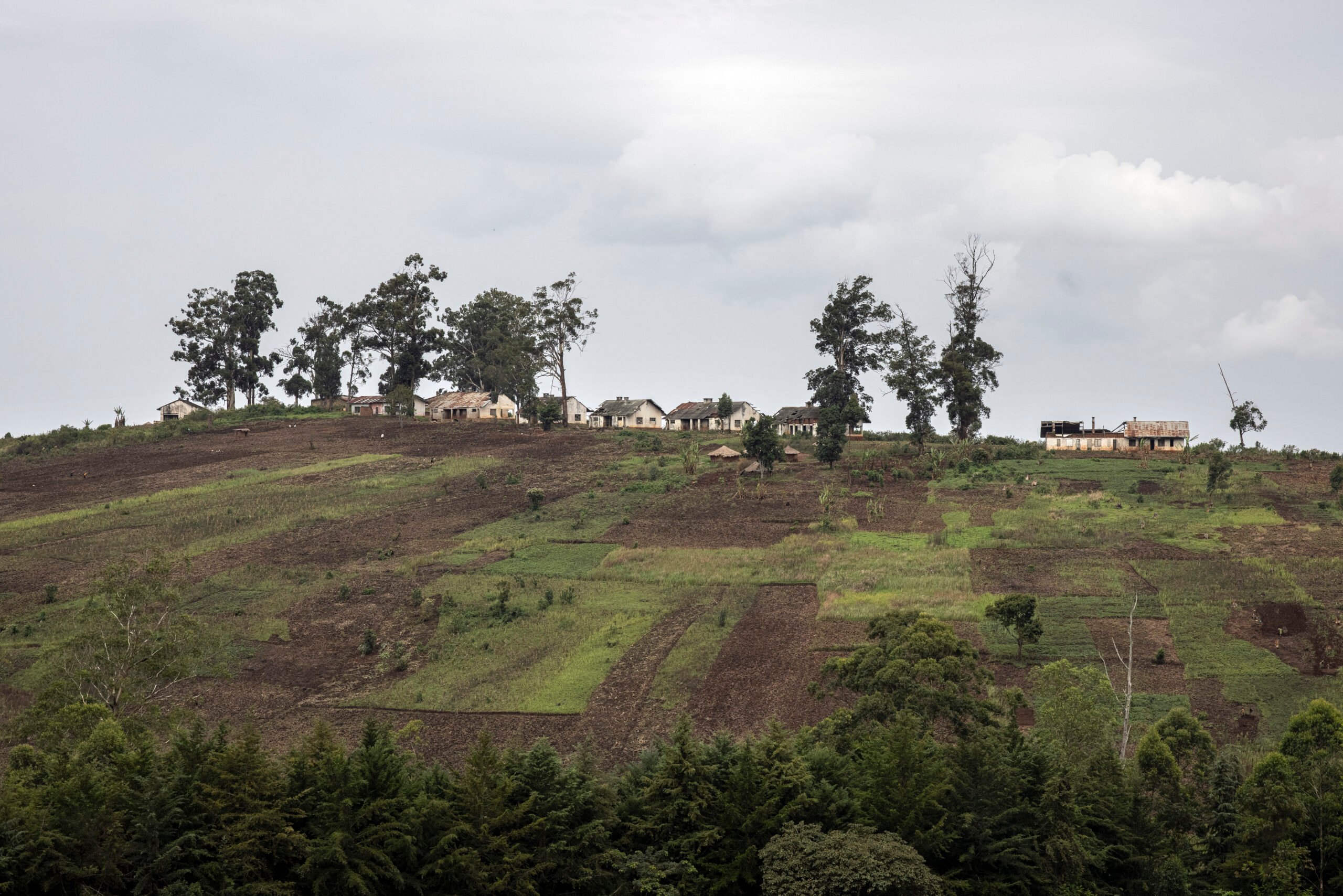
Many villages in Ituri are now abandoned after being attacked by armed groups. Over 1.5 million people in the province have fled their homes over the last five years.
At 4 a.m., Madeleine was jolted awake. “The attackers appeared suddenly, they came to our village by foot, brandishing machetes and guns,” she says. “They raided the whole village, going to one house after another.” Forcing their way into Madeleine’s home, the attackers fell upon her children with machetes. In a matter of minutes, all were dead. Turning their merciless attention to Madeleine, they hacked at her right arm, her left hand, and her head. “As they were hitting me, I fell to the floor, too exhausted to fight them off. I did not have the strength anymore, nor the will to live after they massacred my children.”
“I did not have the strength anymore, nor the will to live after they massacred my children.”
Madeleine was nine months pregnant at the time and, when medical staff arrived after dawn, they found her clinging to life. Doctors performed an emergency caesarian section to deliver the baby and tended to Madeleine’s bleeding wounds. “I don’t know how I survived,” she says.
During the attack on her village of Gudda last year, 17 people were killed, and many others mutilated. Insecurity is driving a crisis in Ituri Province that has forced an estimated 1.5 million people from their homes over the last six years. The violence has become so widespread and commonplace, that even those who seek sanctuary in camps for internally displaced people (IDPs) are no longer safe.
After years of relative calm, 2017 saw the start of systematic attacks on villages by various armed groups. They burn houses, steal livestock, and slaughter entire families. The seemingly senseless attacks are driven by a desire to control access to Ituri’s vast mineral wealth, especially gold, but they are also fuelled by deep-rooted animosities between two communities – the Hema, who are traditionally herders, and the farming Lendu.
Attacks have increased in frequency and ferocity. “Two years ago, we would receive 10 wounded people as a result of an attack,” says Dr George Otshudima, a hospital surgeon in the provincial capital Bunia who operated on Madeleine.
“Nowadays, we receive at least 30 people per attack.”
Madeleine recovering in hospital after the attack on her village in March 2022. Her four children were among 17 people killed.
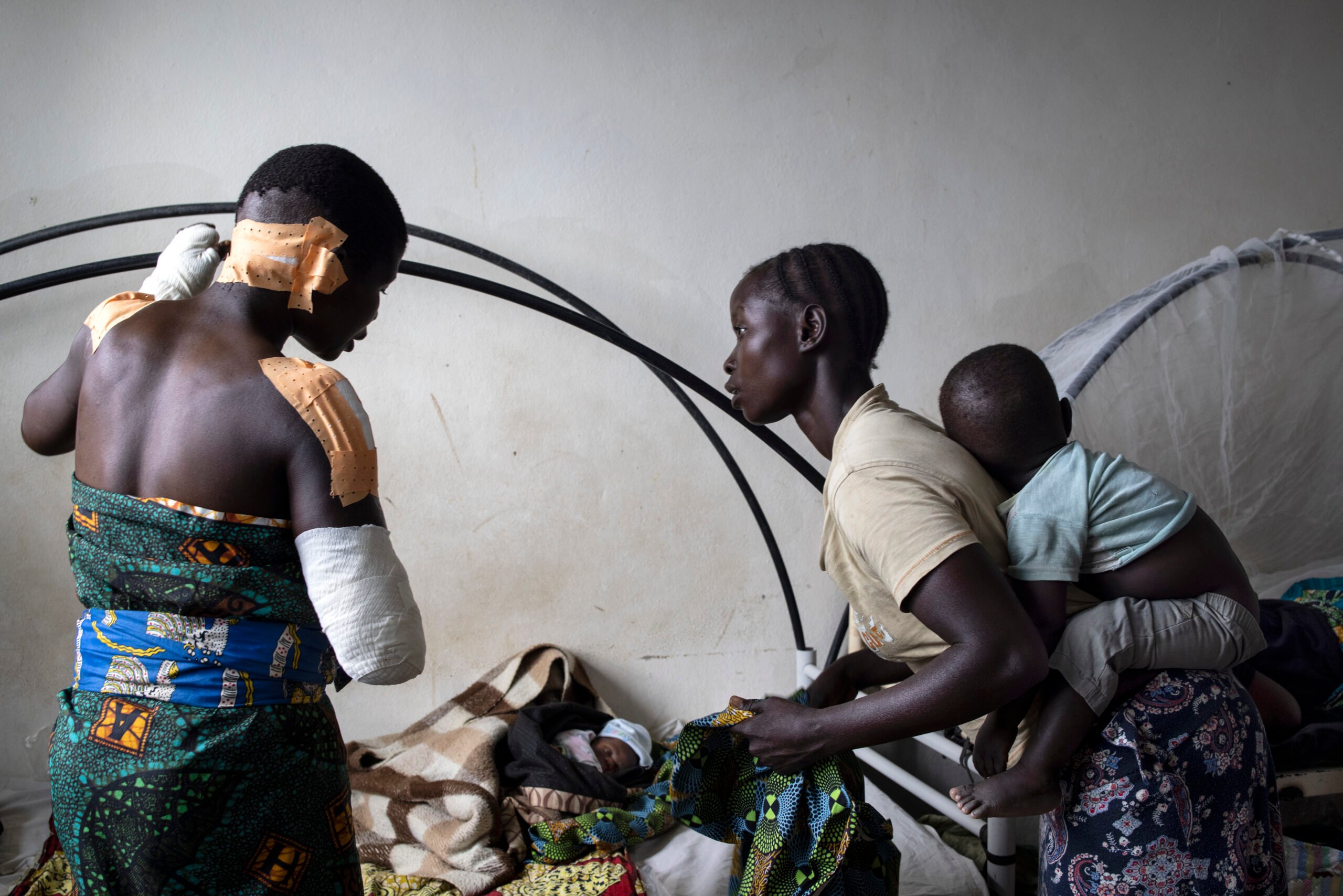
Madeleine recovering in hospital after the attack on her village in March 2022. Her four children were among 17 people killed.
During the attack on her village of Gudda last year, 17 people were killed, and many others mutilated. Insecurity is driving a crisis in Ituri Province that has forced an estimated 1.5 million people from their homes over the last six years. The violence has become so widespread and commonplace, that even those who seek sanctuary in camps for internally displaced people (IDPs) are no longer safe.
After years of relative calm, 2017 saw the start of systematic attacks on villages by various armed groups. They burn houses, steal livestock, and slaughter entire families. The seemingly senseless attacks are driven by a desire to control access to Ituri’s vast mineral wealth, especially gold, but they are also fuelled by deep-rooted animosities between two communities – the Hema, who are traditionally herders, and the farming Lendu.
Attacks have increased in frequency and ferocity. “Two years ago, we would receive 10 wounded people as a result of an attack,” says Dr George Otshudima, a hospital surgeon in the provincial capital Bunia who operated on Madeleine.
“Nowadays, we receive at least 30 people per attack.”
He continues, “I am the only surgeon in this hospital, so I end up doing surgeries one after the other. My colleagues and I work 24 hours to keep people alive.” Otshudima adds that the hospital is poorly stocked, lacking both medicine and equipment.
Over 278,000 people are now living in 67 sites for internally displaced people across the province. Few are willing to risk returning home to work their fields, and the countryside is filled with abandoned and burned villages that have fallen under the control of armed groups. Those who dare to return risk kidnap, murder, and sometimes beheading.
A 14-year-old boy rests at the hospital watched by his aunt. He received several machete blows to his head during an attack on his village. His mother and two younger brothers were killed.
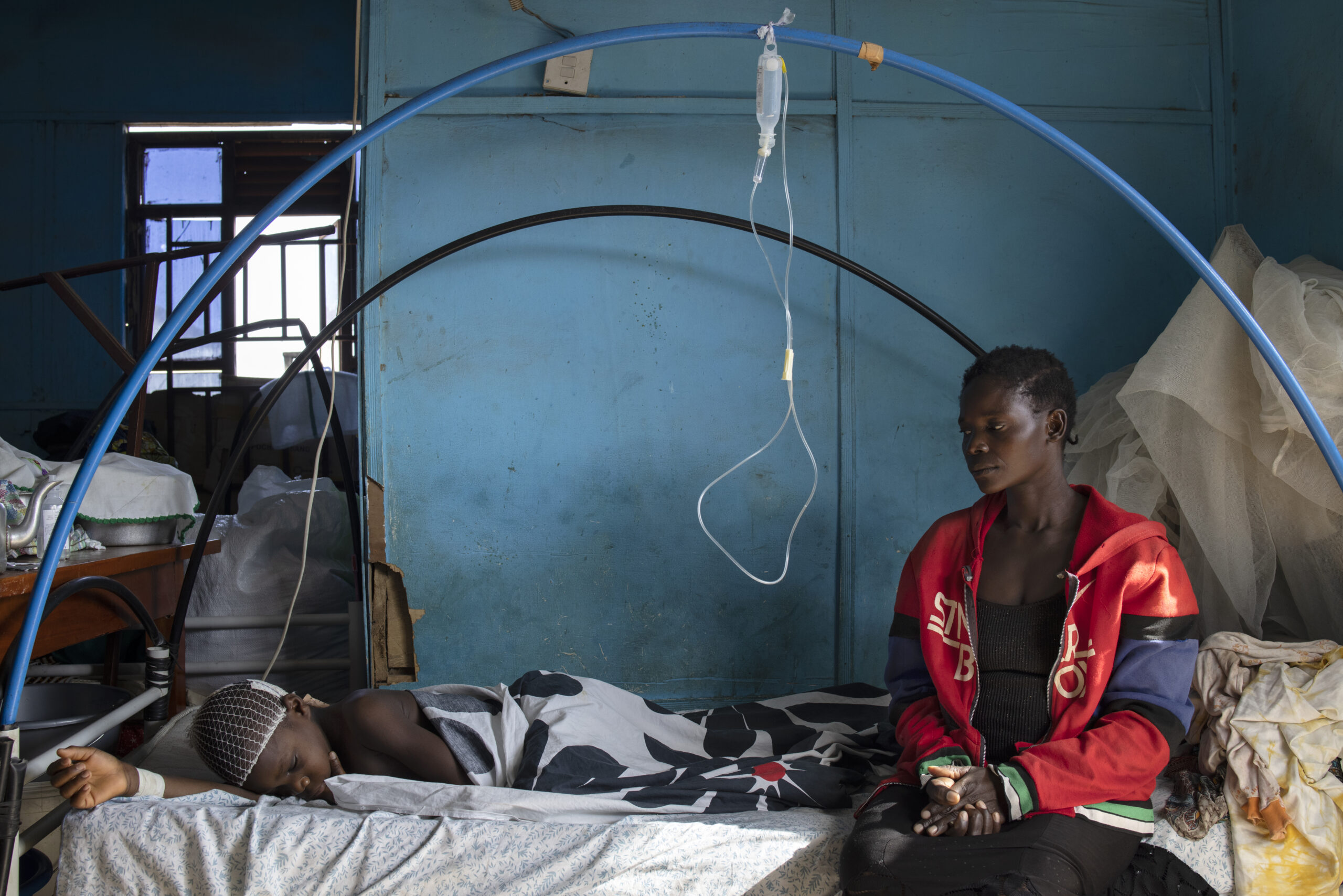
A 14-year-old boy rests at the hospital watched by his aunt. He received several machete blows to his head during an attack on his village. His mother and two younger brothers were killed.
He continues, “I am the only surgeon in this hospital, so I end up doing surgeries one after the other. My colleagues and I work 24 hours to keep people alive.” Otshudima adds that the hospital is poorly stocked, lacking both medicine and equipment.
Over 278,000 people are now living in 67 sites for internally displaced people across the province. Few are willing to risk returning home to work their fields, and the countryside is filled with abandoned and burned villages that have fallen under the control of armed groups. Those who dare to return risk kidnap, murder, and sometimes beheading.
Attacks on civilians occur daily. On 8 January, armed groups attacked four villages in Drodro district, Djugu territory, killing at least 25 people, including five children, and burning dozens of houses. Most of those killed were returnees. Following the attacks, most of the villagers fled to the nearby Rhoe IDP site where many of them are still staying in the open. In total, at least 1,264 IDPs and returnees were murdered by armed groups in 2022 across just six territories in the provinces of Ituri and Haut-Uélé.
Even in designated IDP camps, people are not guaranteed safety. On 1 February 2022, 62 people were killed and dozens seriously wounded during a major attack on Plaine Savo displacement site in Djugu territory, home to over 40,000 people.
A burned-out house in a deserted village in Djugu territory, Ituri Province.
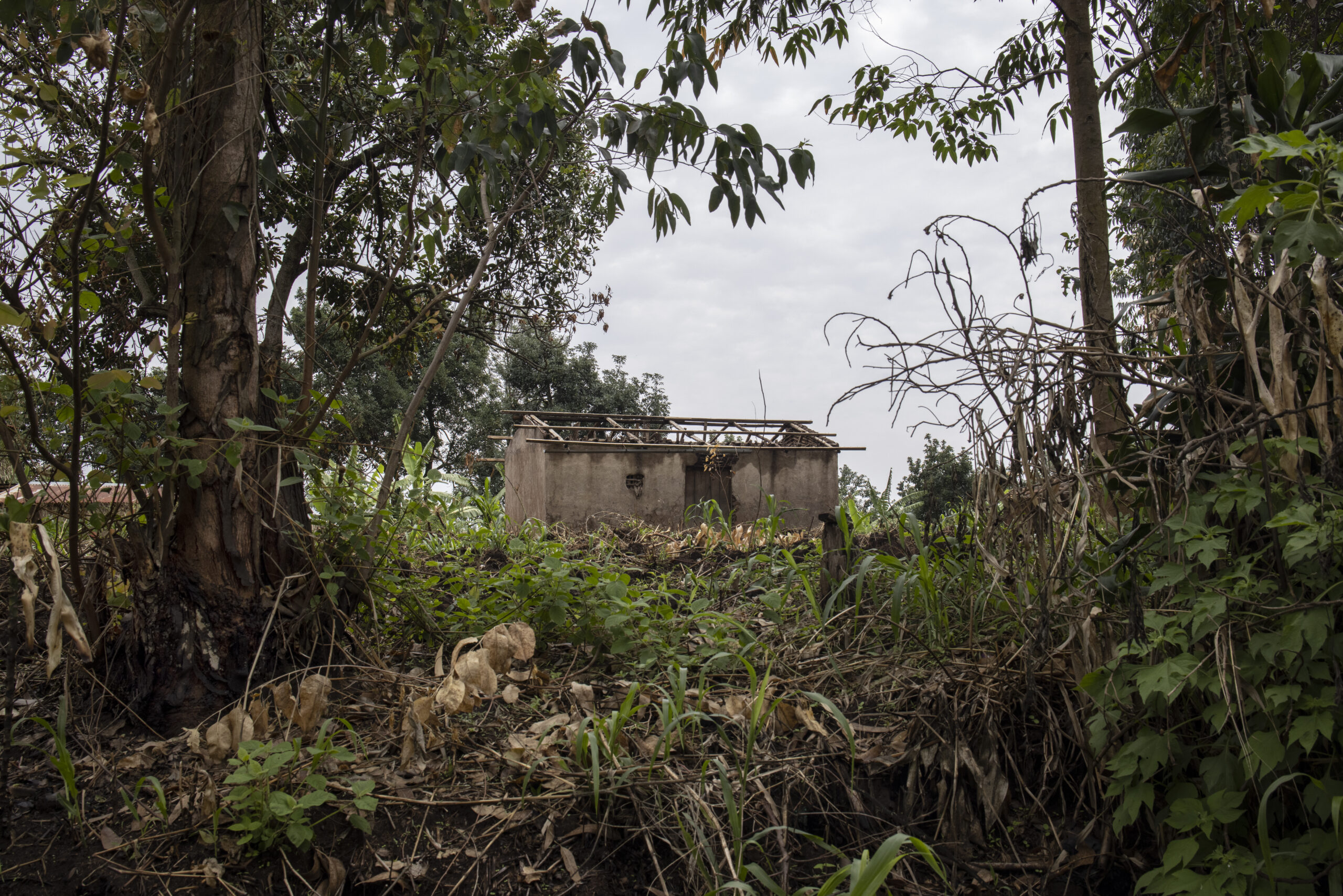
A burned-out house in a deserted village in Djugu territory, Ituri Province.
Attacks on civilians occur daily. On 8 January, armed groups attacked four villages in Drodro district, Djugu territory, killing at least 25 people, including five children, and burning dozens of houses. Most of those killed were returnees. Following the attacks, most of the villagers fled to the nearby Rhoe IDP site where many of them are still staying in the open. In total, at least 1,264 IDPs and returnees were murdered by armed groups in 2022 across just six territories in the provinces of Ituri and Haut-Uélé.
Even in designated IDP camps, people are not guaranteed safety. On 1 February 2022, 62 people were killed and dozens seriously wounded during a major attack on Plaine Savo displacement site in Djugu territory, home to over 40,000 people.
“Violence has reached unacceptable levels in the past months with armed groups also attacking settlements where displaced people have found refuge after their villages were raided,” says Denis Oulai, former UNHCR Head of Office in Bunia.
“This is terrifying. The displaced have no safe place to go to, and many of them have already been displaced multiple times”.
“The displaced have no safe place to go.”
Displaced people gather for Sunday morning mass in Plain Savo site and pray for the 62 people who were killed on 1 February 2022.
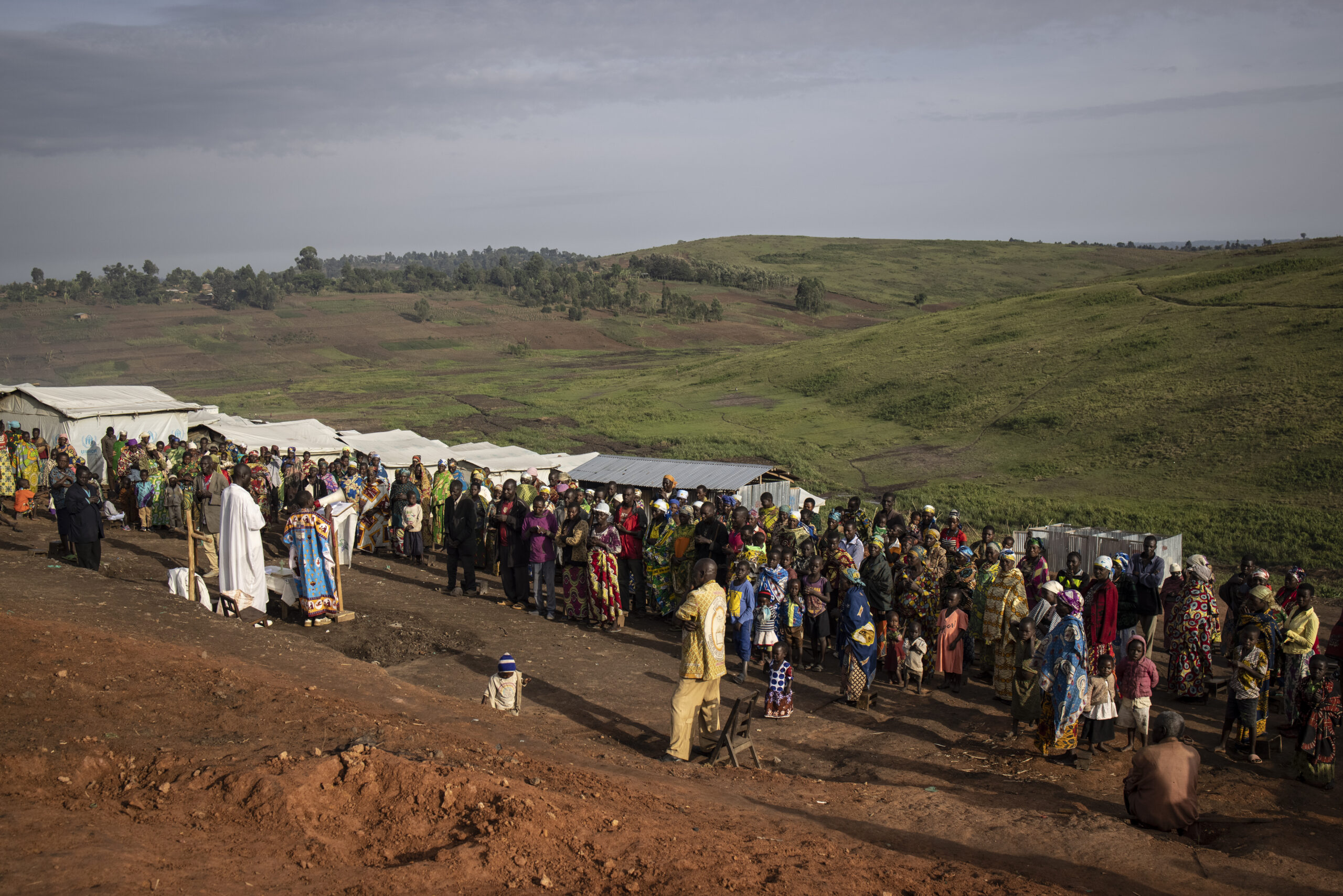
Displaced people gather for Sunday morning mass in Plain Savo site and pray for the 62 people who were killed on 1 February 2022.
“Violence has reached unacceptable levels in the past months with armed groups also attacking settlements where displaced people have found refuge after their villages were raided,” says Denis Oulai, former UNHCR Head of Office in Bunia.
“This is terrifying. The displaced have no safe place to go to, and many of them have already been displaced multiple times”.
“The displaced have no safe place to go.”
The February attack on the Plaine Savo site began at 8:45 p.m. when 100 armed men and some women invaded the site. They went from shelter to shelter, killing whoever they found with guns and machetes until United Nations peacekeepers from MONUSCO (the UN Organization Stabilization Mission in the DRC) arrived to secure the site.
Richard lost his beloved 27-year-old son, Désiré, in the attack. “He was walking among the shelters, instructing people by megaphone to flee in the opposite direction of where the attackers were,” says Richard, who followed his son’s commands and ran to hide in the bush with his wife, and 10 children and grandchildren. “It was dark, and my son did not see the attackers. He was shot several times. Then they struck his face with a machete,” says Richard.
Women return to their shelters in Plain Savo displacement site at the end of the day after collecting water to cook and bathe children.
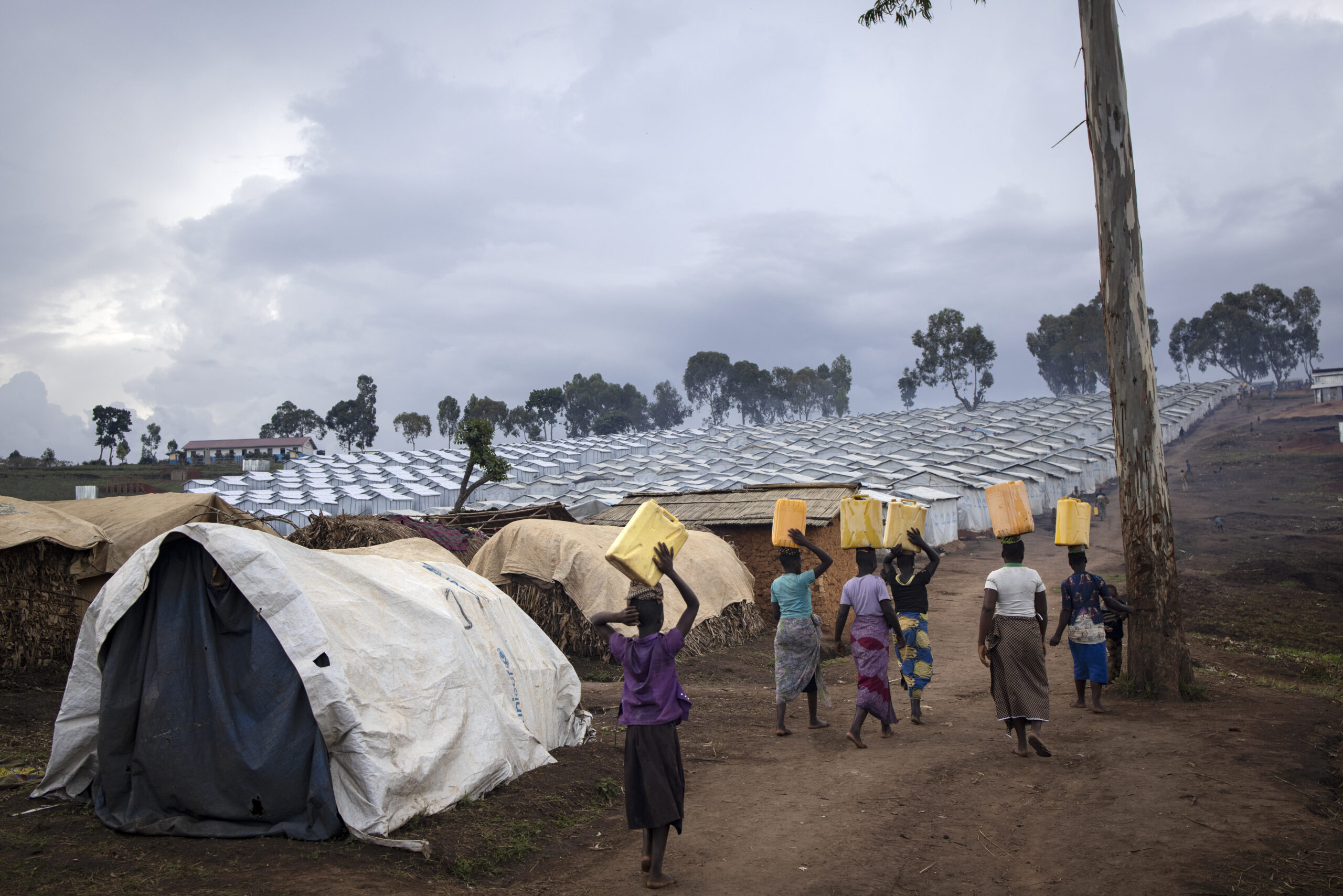
Women return to their shelters in Plain Savo displacement site at the end of the day after collecting water to cook and bathe children.
The February attack on the Plaine Savo site began at 8:45 p.m. when 100 armed men and some women invaded the site. They went from shelter to shelter, killing whoever they found with guns and machetes until United Nations peacekeepers from MONUSCO (the UN Organization Stabilization Mission in the DRC) arrived to secure the site.
Richard lost his beloved 27-year-old son, Désiré, in the attack. “He was walking among the shelters, instructing people by megaphone to flee in the opposite direction of where the attackers were,” says Richard, who followed his son’s commands and ran to hide in the bush with his wife, and 10 children and grandchildren. “It was dark, and my son did not see the attackers. He was shot several times. Then they struck his face with a machete,” says Richard.
Désiré was buried in a mass grave at Plaine Savo. Almost a year later, Richard can still be found disconsolate, wandering the paths his son used to walk, in the forlorn hope of seeing him again. “My son made the ultimate sacrifice. He died warning people to flee,” says the 58-year-old. “He was my eldest son. He used to take care of me when I was sick. He was very present in my life.”
Richard has been displaced and living in Plaine Savo since August 2019, when the settlement was established. He never thought that armed groups would dare to attack the site. “There is nothing that can draw them here. We have nothing, just shelters.”
“Who will protect us now?”
Richard prays for his son surrounded by his wife, children and grandchildren in Plain Savo site. His son was among 62 people killed during an attack on the site in February 2022.
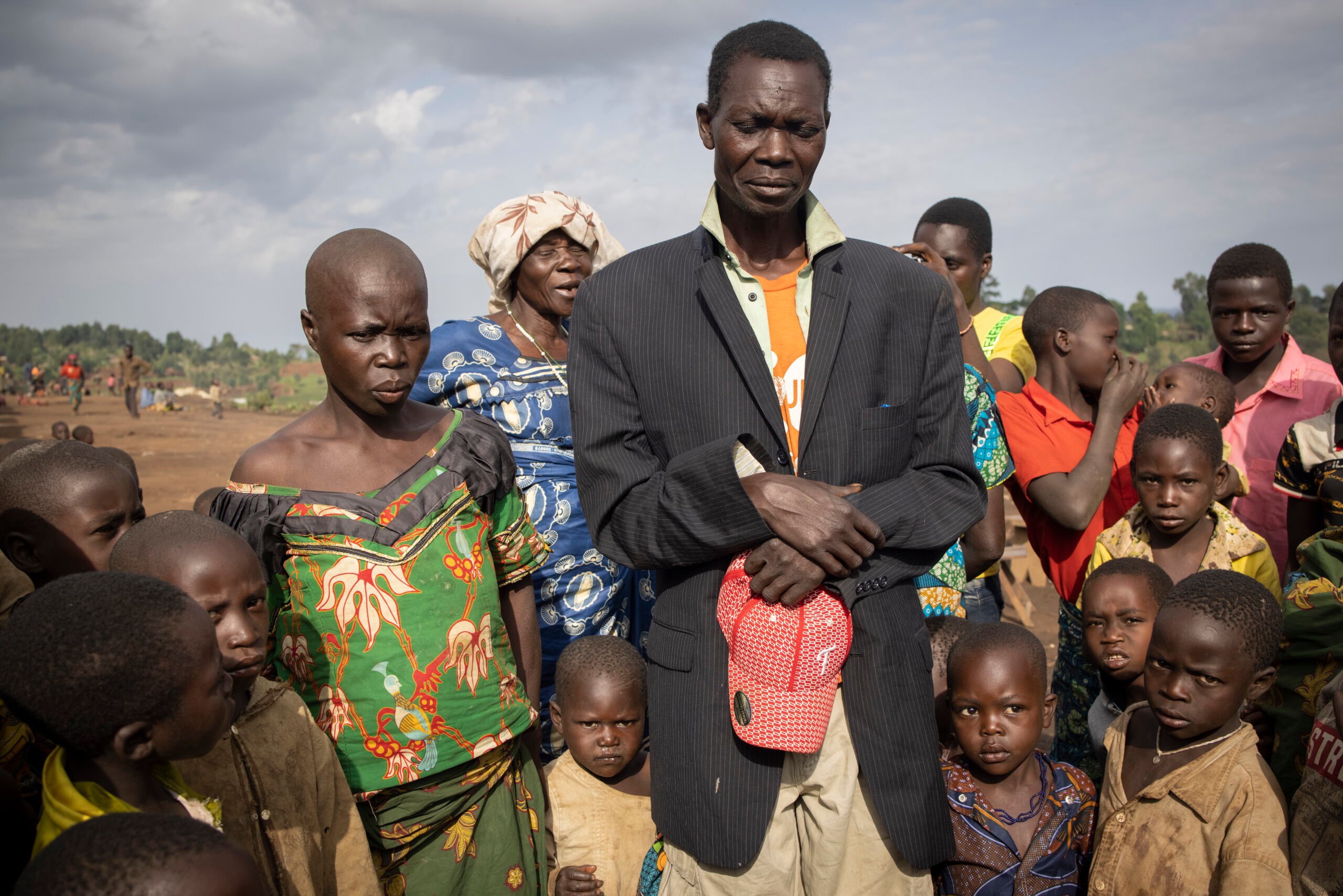
Richard prays for his son surrounded by his wife, children and grandchildren in Plain Savo site. His son was among 62 people killed during an attack on the site in February 2022.
Désiré was buried in a mass grave at Plaine Savo. Almost a year later, Richard can still be found disconsolate, wandering the paths his son used to walk, in the forlorn hope of seeing him again. “My son made the ultimate sacrifice. He died warning people to flee,” says the 58-year-old. “He was my eldest son. He used to take care of me when I was sick. He was very present in my life.”
Richard has been displaced and living in Plaine Savo since August 2019, when the settlement was established. He never thought that armed groups would dare to attack the site. “There is nothing that can draw them here. We have nothing, just shelters.”
“Who will protect us now?”
Life was already hard for displaced people living in Plaine Savo, where most only have enough food for one meal a day. Now, they no longer feel safe, and some 1,500 residents of the camp, mainly women and children, walk every evening to the nearby town of Bulé, three kilometers away, to spend the night with host families, or on the cold floors of schools and churches. They then walk back to Plaine Savo the following morning. Since the attack, adults live in fear, and children suffer nightmares. Poor, hungry, and scared, every day is a struggle for survival.
Women and children try to warm up in the early morning outside the classrooms where they spent the night. Some 1,500 displaced people sleep in this school in Bulé every night.
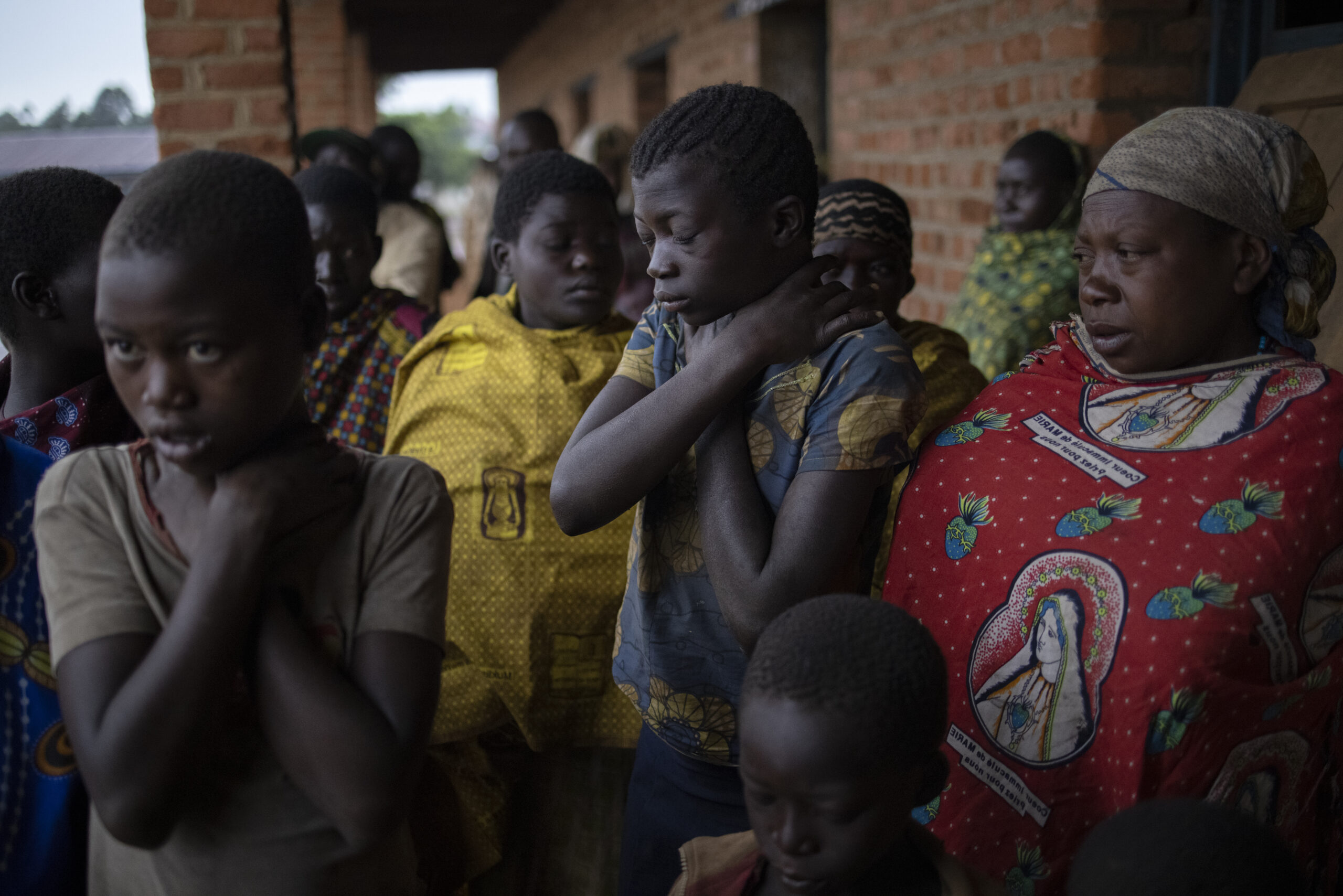
Women and children try to warm up in the early morning outside the classrooms where they spent the night. Some 1,500 displaced people sleep in this school in Bulé every night.
Life was already hard for displaced people living in Plaine Savo, where most only have enough food for one meal a day. Now, they no longer feel safe, and some 1,500 residents of the camp, mainly women and children, walk every evening to the nearby town of Bulé, three kilometers away, to spend the night with host families, or on the cold floors of schools and churches. They then walk back to Plaine Savo the following morning. Since the attack, adults live in fear, and children suffer nightmares. Poor, hungry, and scared, every day is a struggle for survival.
The tragic situation in Ituri is part of a wider and often-overlooked crisis across the DRC, where continued violence and insecurity – especially in the eastern part of the country – has forced more than 5.65 million people to flee their homes – one of the largest IDP populations globally.
UNHCR and its partners in Ituri are providing emergency shelters, distributions of household items, and vital services including psychosocial and legal support to survivors of violence. But it is not enough. The growing insecurity has increased the numbers of people in need while making it harder for aid agencies to reach them.
Women and children walk back to Plain Savo after spending the night in the town of Bulé. They do not feel safe sleeping at the site since the attack in February.
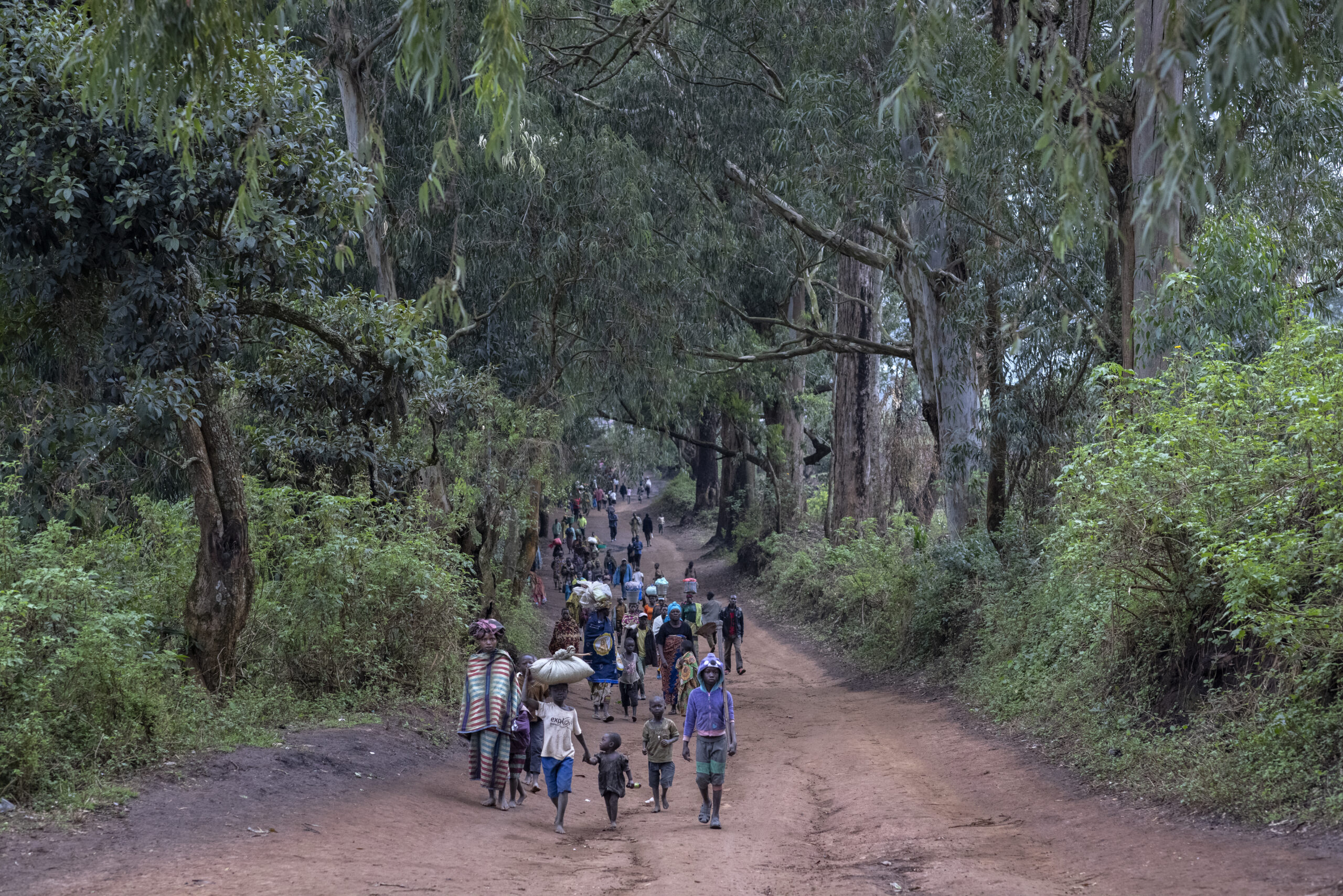
Women and children walk back to Plain Savo after spending the night in the town of Bulé. They do not feel safe sleeping at the site since the attack in February.
The tragic situation in Ituri is part of a wider and often-overlooked crisis across the DRC, where continued violence and insecurity – especially in the eastern part of the country – has forced more than 5.65 million people to flee their homes – one of the largest IDP populations globally.
UNHCR and its partners in Ituri are providing emergency shelters, distributions of household items, and vital services including psychosocial and legal support to survivors of violence. But it is not enough. The growing insecurity has increased the numbers of people in need while making it harder for aid agencies to reach them.
Funding has also failed to keep pace with rising needs in the DRC, a situation exacerbated by the ripple effects of the Ukraine crisis disrupting supply chains and driving up operational costs. By the end of 2022, UNHCR had received only 46 per cent of the US$225 million needed to run its DRC operation that year.
Even the reduced humanitarian assistance available is essential. “If it wasn’t for the intervention of humanitarian actors, we would have seen worse,” says Adamo Sebele Minos, Protection Officer for UNHCR partner INTERSOS.
“The needs are huge: children need more nutritious food, and medical and psychosocial care is also an urgent necessity.”
Early morning at Plain Savo site, where every day is about survival. The site hosts 40,000 internally displaced people.
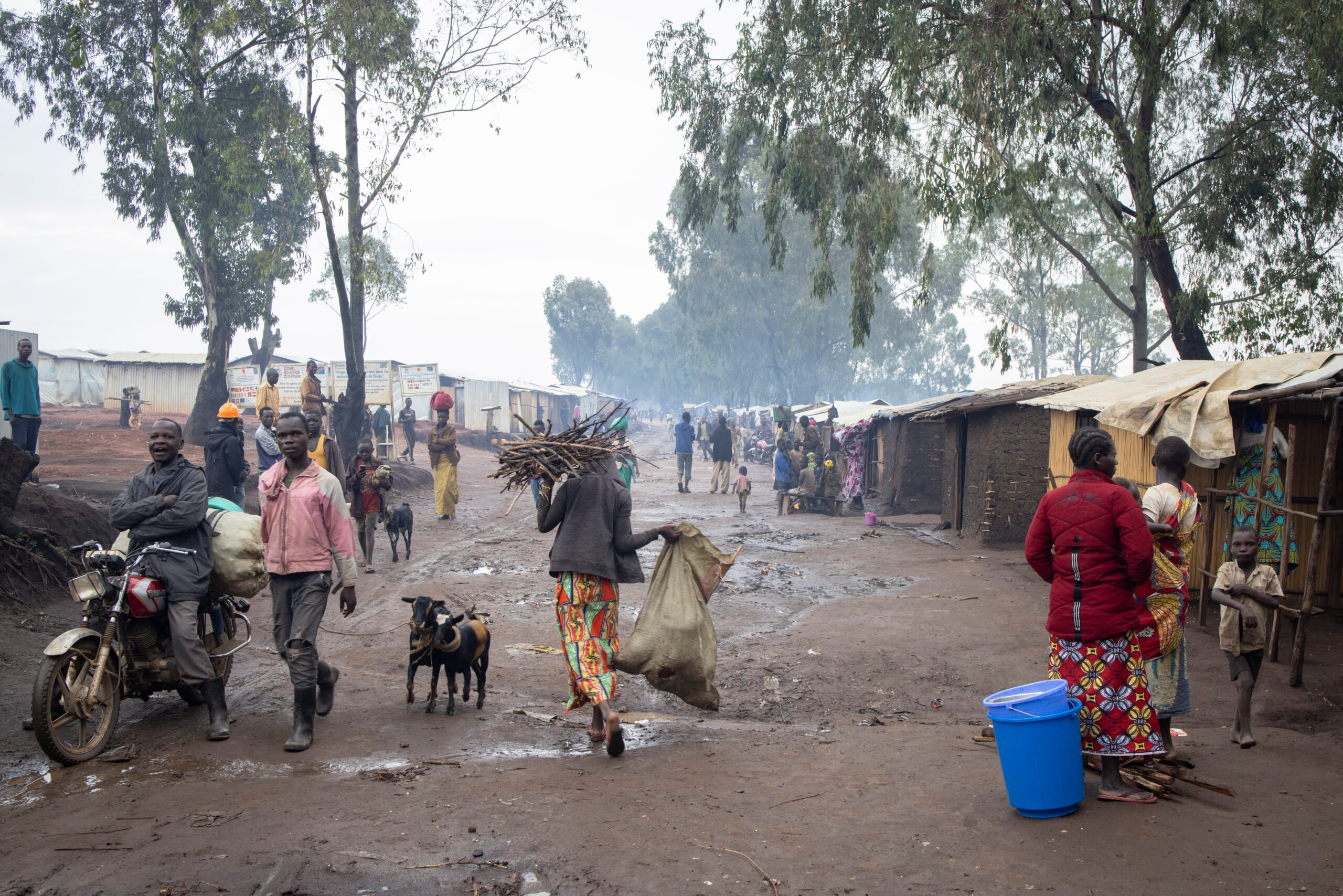
Early morning at Plain Savo site, where every day is about survival. The site hosts 40,000 internally displaced people.
Funding has also failed to keep pace with rising needs in the DRC, a situation exacerbated by the ripple effects of the Ukraine crisis disrupting supply chains and driving up operational costs. By the end of 2022, UNHCR had received only 46 per cent of the US$225 million needed to run its DRC operation that year.
Even the reduced humanitarian assistance available is essential. “If it wasn’t for the intervention of humanitarian actors, we would have seen worse,” says Adamo Sebele Minos, Protection Officer for UNHCR partner INTERSOS.
“The needs are huge: children need more nutritious food, and medical and psychosocial care is also an urgent necessity.”
But what displaced people crave most of all is security: to be able to live in peace, and perhaps one day return to the homes and the lives they were forced to leave behind.
Almost a year after the attack on her village, Madeleine is slowly recovering. She has had more surgery on her left arm, and her baby boy, named Bahati, is healthy and unscathed by the violence roiling around him.
Madeleine is still processing what she has suffered.
“I will tell him one day about the circumstances of his birth,” she says of Bahati. “But for the moment, he’s my ray of hope”.
A young, displaced boy stands in front of his family’s shelter in Plain Savo. Many children at the site only eat one meal a day and wear the same clothes every day.
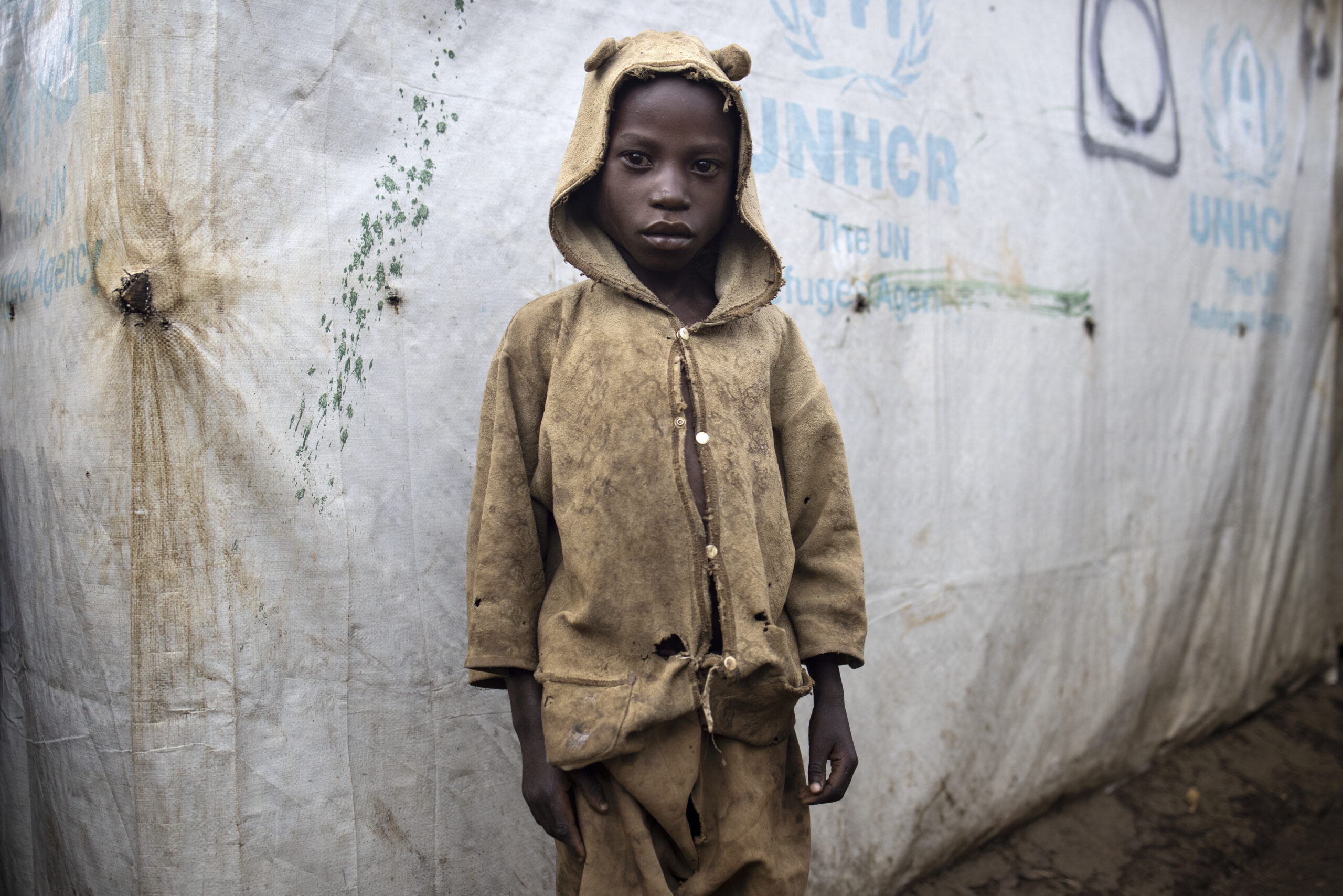
A young, displaced boy stands in front of his family’s shelter in Plain Savo. Many children at the site only eat one meal a day and wear the same clothes every day.
But what displaced people crave most of all is security: to be able to live in peace, and perhaps one day return to the homes and the lives they were forced to leave behind.
Almost a year after the attack on her village, Madeleine is slowly recovering. She has had more surgery on her left arm, and her baby boy, named Bahati, is healthy and unscathed by the violence roiling around him.
Madeleine is still processing what she has suffered.
“I will tell him one day about the circumstances of his birth,” she says of Bahati. “But for the moment, he’s my ray of hope”.

